Books
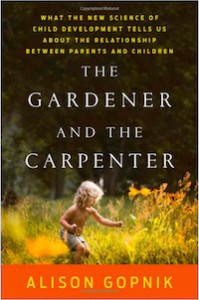
The Gardener and the Carpenter: What the New Science of Child Development Tells Us About the Relationship Between Parents and Children
By John Alison Gopnik 2016
One of the world’s leading child psychologists shatters the myth of “good parenting”.
Caring deeply about our children is part of what makes us human. Yet the thing we call “parenting” is a surprisingly new invention. In the past thirty years, the concept of parenting and the multibillion dollar industry surrounding it have transformed child care into obsessive, controlling, and goal-oriented labor intended to create a particular kind of child and therefore a particular kind of adult. In The Gardener and the Carpenter, the pioneering developmental psychologist and philosopher Alison Gopnik argues that the familiar twenty-first-century picture of parents and children is profoundly wrong–it’s not just based on bad science, it’s bad for kids and parents, too.
Drawing on the study of human evolution and her own cutting-edge scientific research into how children learn, Gopnik shows that although caring for children is profoundly important, it is not a matter of shaping them to turn out a particular way. Children are designed to be messy and unpredictable, playful and imaginative, and to be very different both from their parents and from each other. The variability and flexibility of childhood lets them innovate, create, and survive in an unpredictable world. “Parenting” won’t make children learn—but caring parents let children learn by creating a secure, loving environment.
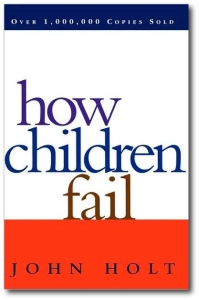
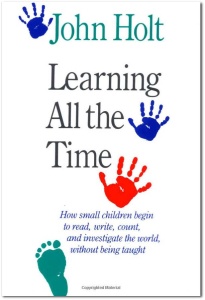
Learning All the Time
By John Holt
The essence of John Holt’s insight into learning and small children is captured in Learning All The Time. This delightful book by the influential author of How Children Fail and How Children Learn shows how children learn to read, write, and count in their everyday life at home and how adults can respect and encourage this wonderful process. For human beings, he reminds us, learning is as natural as breathing. John Holt’s wit, his gentle wisdom, and his infectious love of little children bring joy to parent and teacher alike.
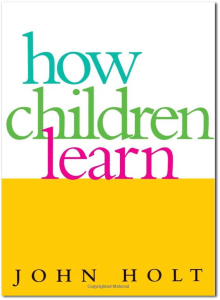
How Children Learn
By John Holt
This enduring classic of educational thought offers teachers and parents deep, original insight into the nature of early learning. John Holt was the first to make clear that, for small children, “learning is as natural as breathing.” In this delightful yet profound book, he looks at how we learn to talk, to read, to count, and to reason, and how we can nurture and encourage these natural abilities in our children.”
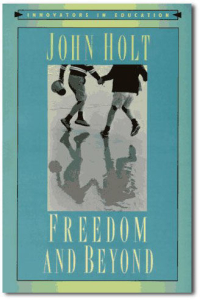
Freedom Beyond
By John Holt
John Holt looks at the role that schooling in society plays in education.
“Freedom and Beyond” represents a significant turning point in Holt’s work. This is the first book in which he looked beyond schooling as the sole problem of education or as the sole solution. No longer would Holt argue that if we could only make schools better, the problems that he and other critics outlined would be solved
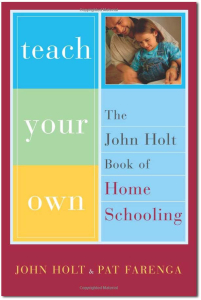
Teach Your Own: The John Holt Book of Homeschooling
By John Holt
Today more than one and a half million children are being taught at home by their own parents. In this expanded edition of the book that helped launch the whole movement, Pat Farenga has distilled John Holt’s timeless understanding of the ways children….
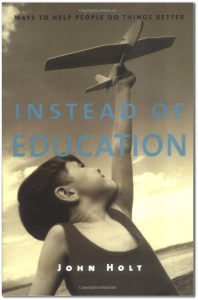
Instead of Education: Ways to Help People Do Things Better
By John Holt
Instead of Education is Holt’s most direct and radical challenge to the educational status quo and a clarion call to parents to save their children from schools of all kinds. In this breakthrough work Holt lays out the foundation for un-schooling as the vital path to self-directed learning and a creative life.
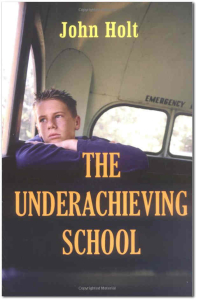
The Underachieving School
By John Holt
The Underachieving School is a collection of essays and articles written and compiled by Holt, each brimming with inspiration and ideas on how to teach children—taking into account the ways in which children actually learn. Through his original thinking, clear and thoughtful writing, and firsthand accounts of what does and doesn’t work in education, this book shows us the difference between learning and schooling
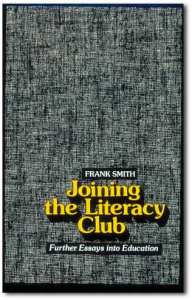
Joining the Literacy Club: Further Essays into Education
By John Holt
“The Literacy Club,” Frank Smith’s metaphor describing the social nature of literacy learning, has become widely used in recent years. The essays in this collection reflect Smith’s belief that we learn from other people, not so much through conscious emulation as by “joining the club” of people we see ourselves as being like, and by being helped to engage in their activities. The general theme holding the essays together is that the most significant people in every learner’s life are teachers the formal teachers of the classroom, the informal (and less frequently acknowledged) teachers in the world outside school, and the teachers (scarcely ever recognized) who are the authors of the books we read.
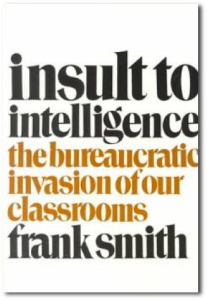
Insult to Intelligence: The Bureaucratic Invasion of Our Classrooms
By Frank Smith
Common sense tells us that drilling, testing, and grading have nothing to do with how babies, children, and adults really learn. And research backs this up. Students who had been asked to write regularly without being taught to punctuate, for instance, ended a term not only writing but punctuating much better than students in a neighboring class who had been regularly drilled, tested, and graded solely on punctuation. This must be the most tedious, least rewarding, and least effective teaching that students have to endure. But false theory, political pressures, business opportunism, and harried administrators have persuaded us to accept this bureaucratic travesty of teaching as the real think.
Insult to Intelligence focuses particularly on children learning to read and write, the area in which Smith has made his reputation. But his six-point manifesto on learning and teaching is applicable at every level of education, and in the context of America’s ongoing struggle to upgrade the teaching profession and to raise national standards of literacy, his book is nothing less than a call to arms.
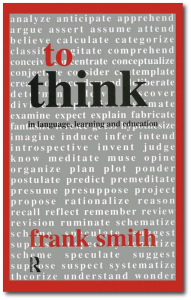
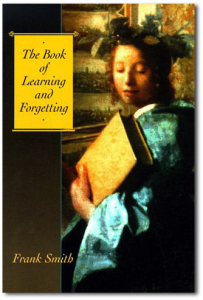
The Book of Learning and Forgetting
By Frank Smith
In this thought-provoking book, Frank Smith explains how schools and educational authorities systematically obstruct the powerful inherent learning abilities of children, creating handicaps that often persist through life. The author eloquently contrasts a false and fabricated “official theory” that learning is work (used to justify the external control of teachers and students through excessive regulation and massive testing) with a correct but officially suppressed “classic view” that learning is a social process that can occur naturally and continually through collaborative activities. This book will be crucial reading in a time when national authorities continue to blame teachers and students for alleged failures in education. It will help educators and parents to combat sterile attitudes toward teaching and learning and prevent current practices from doing further harm.
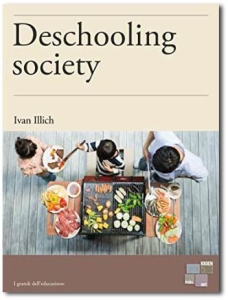
Deschooling Society
By Ivan Illich
Schools have failed our individual needs, supporting false and misleading notions of ‘progress’ and development fostered by the belief that ever-increasing production, consumption and profit are proper yardsticks for measuring the quality of human life. Our universities have become recruiting centers for the personnel of the consumer society, certifying citizens for service, while at the same time disposing of those judged unfit for the competitive rat race. In this bold and provocative book, Illich suggest some radical and exciting reforms for the education system.
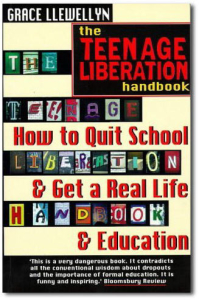
The Teenage Liberation Handbook: How to Quit School and Get a Real Life and Education
By Grace Llewellyn
Ad admodum suavitate vel. Cu alii molestiae eos, scaevola tractatos scribentur per ex, suas accumsan nominati te sit. Nulla graeci vis no. Est vocent fuisset ad, quo ut tibique explicari, no oblique imperdiet his.
Ad sed etiam accumsan. Ut quas utinam apeirian nam, tota delenit ad eos. Ex sed audiam mentitum recteque, sea diam tation eruditi an. At posse persecuti eum, vis esse propriae definiebas ne, ex vix scaevola disputando philosophia.
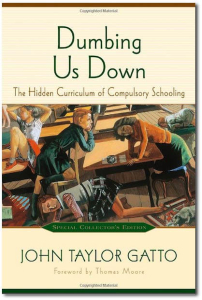
Dumbing Us Down: The Hidden Curriculum of Compulsory Schooling
By John Taylor Gatto
With over 70,000 copies of the first edition in print, this radical treatise on public education has been a New Society Publishers’ bestseller for 10 years! Thirty years in New York City’s public schools led John Gatto to the sad conclusion that compulsory schooling does little but teach young people to follow orders like cogs in an industrial machine. This second edition describes the wide-spread impact of the book and Gatto’s “guerrilla teaching.”
John Gatto has been a teacher for 30 years and is a recipient of the New York State Teacher of the Year award. His other titles include A Different Kind of Teacher (Berkeley Hills Books, 2001) and The Underground History of American Education (Oxford Village Press, 2000).
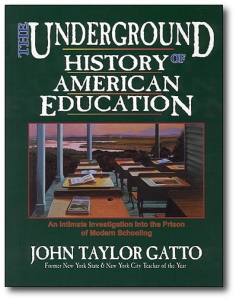
The Underground History of American Education: An Investigation Into the Prison of Modern Schooling
By John Taylor Gatto 2000
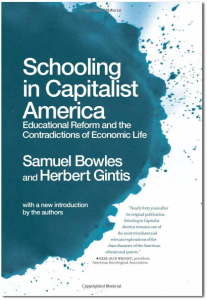
Schooling in Capitalist America
By Samuel Bowles
“This seminal work . . . establishes a persuasive new paradigm.”—Contemporary Sociology
No book since Schooling in Capitalist America has taken on the systemic forces hard at work undermining our education system. This classic reprint is an invaluable resource for radical educators.
Samuel Bowles is research professor and director of the behavioral sciences program at the Santa Fe Institute, and professor emeritus of economics at the University of Massachusetts.
Herbert Gintis is an external professor at the Santa Fe Institute and emeritus professor of economics at the University of Massachusetts.

In Their Own Way: Discovering and Encouraging Your Child’s Multiple Intelligences
By Thomas Armstrong 2000
Does your child have a favorite subject, activity, or hobby? Children learn in multiple ways, and educator Thomas Armstrong has shown hundreds of thousands of parents and teachers how to locate those unique areas in each of our children where learning and creativity seem to flow with special vigor.
In this fully updated classic on multiple intelligences, Armstrong sheds new light on the “eight ways to bloom,” or the eight kinds of “multiple intelligences.” While everyone possesses all eight intelligences, Armstrong delineates how to discover your child’s particular areas of strength among them.
The book shatters the conventional wisdom that brands our students as “underachievers,” “unmotivated,” or as suffering from “learning disabilities,” “attention deficit hyperactivity disorder,” or other “learning diseases.” Armstrong explains how these flawed labels often overlook students who are in possession of a distinctive combination of multiple intelligences, and demonstrates how to help them acquire knowledge and skills according to their sometimes extraordinary aptitudes.
Filled with resources for the home and classroom, this new edition of In Their Own Way offers inspiration for every learning situation.
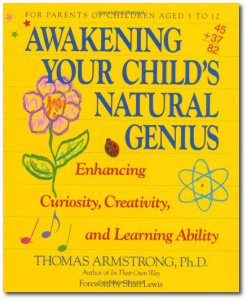
Awakening Your Child’s Natural Genius
By Thomas Armstrong 1991
Baby-boomer parents with nearly 26 million children and more on the way–are looking for new and creative ways to help their youngsters develop and achieve their full potential. They want practical ideas for activities to do at home and authoritative advice on how to get the most out of their children’s schools. Illustrations throughout.
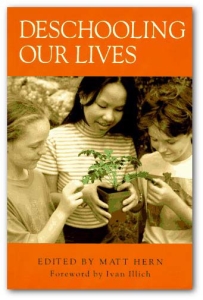
Deschooling Our Lives
By Matt Hern
A provocative, practical response to the crisis in our schools, this book argues boldly for replacing compulsory schooling with a wide variety of home, neighborhood, and community-based educational efforts. Hern examines how the day-to-day experience of school teaches subservience, deadens children’s natural love of learning, undercuts their self-esteem, and limits independent thought.
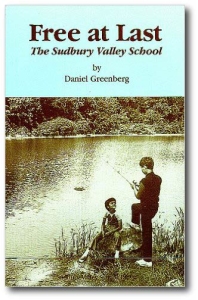
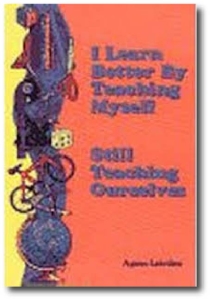
I Learn Better by Teaching Myself and Still Teaching Ourselves
By Agnes Leistico 1997
This new edition combines two popular books under one cover. How a homeschooling mother learned to trust her children-and herself-to learn in new ways. Covers elementary years through high school. These books are especially good for anyone wrestling with the question of “how much structure should there be in a homeschool?”

Free to Learn
By Peter Gray 2013
Our children spend their days being passively instructed, and made to sit still and take tests—often against their will. We call this imprisonment schooling, yet wonder why kids become bored and misbehave. Even outside of school children today seldom play and explore without adult supervision, and are afforded few opportunities to control their own lives. The result: anxious, unfocused children who see schooling—and life—as a series of hoops to struggle through.
In Free to Learn, developmental psychologist Peter Gray argues that our children, if free to pursue their own interests through play, will not only learn all they need to know, but will do so with energy and passion. Children come into this world burning to learn, equipped with the curiosity, playfulness, and sociability to direct their own education. Yet we have squelched such instincts in a school model originally developed to indoctrinate, not to promote intellectual growth.
To foster children who will thrive in today’s constantly changing world, we must entrust them to steer their own learning and development. Drawing on evidence from anthropology, psychology, and history, Gray demonstrates that free play is the primary means by which children learn to control their lives, solve problems, get along with peers, and become emotionally resilient. This capacity to learn through play evolved long ago, in hunter-gatherer bands where children acquired the skills of the culture through their own initiatives. And these instincts still operate remarkably well today, as studies at alternative, democratically administered schools show. When children are in charge of their own education, they learn better—and at lower cost than the traditional model of coercive schooling.
A brave, counterintuitive proposal for freeing our children from the shackles of the curiosity-killing institution we call school, Free to Learn suggests that it’s time to stop asking what’s wrong with our children, and start asking what’s wrong with the system. It shows how we can act—both as parents and as members of society—to improve children’s lives and promote their happiness and learning.
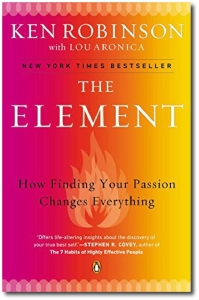
The Element: How Finding Your Passion Changes Everything
By Ken Robinson 2009
The Element is the point at which natural talent meets personal passion. When people arrive at the Element, they feel most themselves and most inspired and achieve at their highest levels. With a wry sense of humor, Ken Robinson looks at the conditions that enable us to find ourselves in the Element and those that stifle that possibility. Drawing on the stories of a wide range of people, including Paul McCartney, Matt Groening, Richard Branson, Arianna Huffington, and Bart Conner, he shows that age and occupation are no barrier and that this is the essential strategy for transforming education, business, and communities in the twenty-first century.
A breakthrough book about talent, passion, and achievement from one of the world’s leading thinkers on creativity and self-fulfillment.
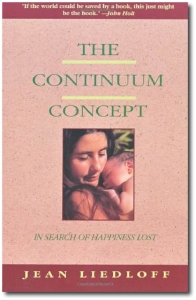
The Continuum Concept: In Search Of Happiness Lost
By Jean Liedloff 2008
“Jean Liedloff, an American writer, spent two and a half years in the South American jungle living with Stone Age Indians. The experience demolished her Western preconceptions of how we should live and”
A breakthrough book about talent, passion, and achievement from one of the world’s leading thinkers on creativity and self-fulfillment.

Real Lives: Eleven Teenagers Who Don’t Go to School Tell Their Own Stories
By Grace Llewellyn (editor) 2005
In 1993, eleven homeschooled teenagers described their lives in rich detail, and Real Lives quickly became a homeschooling classic. Erin’s favorite teacher was her horse Nick, blind in one eye. Kyla flew to South America in September of what would have been her senior year—alone, except for her mountain bike. Jeremiah and his sister Serena published a newsletter on peace issues. Patrick, who hoped someday to design video games, had spent the past few years compiling portfolios of his writing and artwork. Rebecca worked at homeless shelters and, through Habitat for Humanity, built houses for people in need. Anne tended honeybees and plucked a bluegrass banjo. Ayanna kept pace with 50 pen-pals—mostly in Africa—while Kevin talked with people all over the world on his ham radio. Amanda performed with a violin quintet and worked through the mail with her writing mentor. Vallie answered questions at a marine science center; Tabitha answered the phone at a crisis line, and helped midwives at births…. ….Now those eleven homeschoolers have grown up and engaged the territory of adulthood, college, and career—and the new edition of Real Lives includes updates from all of them. From gaining admission to an Ivy League institution without taking the SAT to crafting a simple life centered on writing and gardening, they tell where life has taken them and where they have taken life, and offer hindsight and advice for others choosing to learn outside of school.

Drive: The Surprising Truth About What Motivates Us
By Daniel H. Pink 2011
The New York Times bestseller that gives readers a paradigm—shattering new way to think about motivation.
Most people believe that the best way to motivate is with rewards like money—the carrot-and-stick approach. That’s a mistake, says Daniel H. Pink (author of To Sell Is Human: The Surprising Truth About Motivating Others). In this provocative and persuasive new book, he asserts that the secret to high performance and satisfaction-at work, at school, and at home—is the deeply human need to direct our own lives, to learn and create new things, and to do better by ourselves and our world.
Drawing on four decades of scientific research on human motivation, Pink exposes the mismatch between what science knows and what business does—and how that affects every aspect of life. He examines the three elements of true motivation—autonomy, mastery, and purpose-and offers smart and surprising techniques for putting these into action in a unique book that will change how we think and transform how we live.
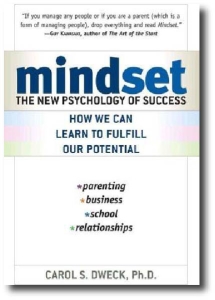
Mindset: The New Psychology of Success
By Carol Dweck 2007/h4>
World-renowned Stanford University psychologist Carol Dweck, in decades of research on achievement and success, has discovered a truly groundbreaking idea—the power of our mindset.
Dweck explains why it’s not just our abilities and talent that bring us success—but whether we approach them with a fixed or growth mindset. She makes clear why praising intelligence and ability doesn’t foster self-esteem and lead to accomplishment, but may actually jeopardize success. With the right mindset, we can motivate our kids and help them to raise their grades, as well as reach our own goals—personal and professional. Dweck reveals what all great parents, teachers, CEOs, and athletes already know: how a simple idea about the brain can create a love of learning and a resilience that is the basis of great accomplishment in every area.
Praise for Mindset
“Everyone should read this book.”—Chip and Dan Heath, authors of Switch and Made to Stick
“Will prove to be one of the most influential books ever about motivation.”—Po Bronson, author of NurtureShock
“A good book is one whose advice you believe. A great book is one whose advice you follow. I have found Carol Dweck’s work on mindsets invaluable in my own life, and even life-changing in my attitudes toward the challenges that, over the years, become more demanding rather than less. This is a book that can change your life, as its ideas have changed mine.”—Robert J. Sternberg, IBM Professor of Education and Psychology at Yale University, director of the PACE Center of Yale University, and author of Successful Intelligence
“If you manage any people or if you are a parent (which is a form of managing people), drop everything and read Mindset.”—Guy Kawasaki, author of The Art of the Start and the blog How to Change the World
“Highly recommended . . . an essential read for parents, teachers [and] coaches . . . as well as for those who would like to increase their own feelings of success and fulfillment.”—Library Journal (starred review)
“A serious, practical book. Dweck’s overall assertion that rigid thinking benefits no one, least of all yourself, and that a change of mind is always possible, is welcome.”—Publishers Weekly
“A wonderfully elegant idea . . . It is a great book.”—Edward M. Hallowell, M.D., author of Delivered from Distraction
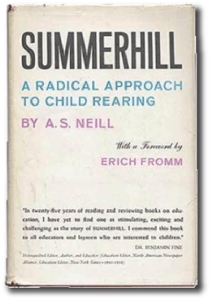
Summerhill: A Radical Approach to Child Rearing
by Alexander Sutherland Neill (Author), Erich Fromm (Foreword) 1960>
World-renowned Stanford University psychologist Carol Dweck, in decades of research on achievement and success, has discovered a truly groundbreaking idea—the power of our mindset.
The author records his unique opinions on child rearing and education, as practiced in the experimental school called Summerhill he has run in England for forty years.

Schools On Trial: How Freedom and Creativity Can Fix Our Educational Malpractice
by Nikhil Goyal 2016
An all-in attack on the American way of education and a hopeful blueprint for change by one of the most passionate and certainly youngest (twenty) writers of this subject.
Are America’s schools little more than cinder-block gulags that spawn vicious cliques and bullying, negate creativity, and true learning and squelch curiosity in their inmates, um, students? Nikhil Goyal, a journalist and activist all of twenty years old whom the” Washington Post” has dubbed a future education secretary and “Forbes” has named to its 30 Under 30 list, passionately thinks so, and in this book he offers both a scathing indictment of our teach-to-the-test-while-killing-the-spirit educational assembly line and maps out a path for all of our schools to harness children’s natural aptitude for learning by creating an atmosphere conducive to freedom and creativity. He prescribes an inspiring educational future that is thoroughly democratic and experiential, and one that utilizes the entire community as a classroom.
Purchase here
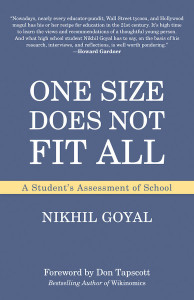
One Size Does Not Fit All: A Student’s Assessment of School
by Nikhil Goyal 2012
When Nikhil Goyal was seventeen-years-old, he wrote this book: One Size Does Not Fit All. It offers a groundbreaking prescription for transforming American schools. Drawing from hundreds of interviews with renowned thinkers like Howard Gardner, Seth Godin, Dan Pink, Noam Chomsky, Diane Ravitch, and Frank Bruni, he calls to radically redefine the way the country does schooling. From implementing an anti-disciplinary curriculum to reinventing the teaching profession, his propositions are timely and provocative. Goyal walks us through the tenets of the system, shattering claims dispersed in the education conversation.
Goyal presses questions like: What if we tailored education to every single child? What if students’ voices were heard and seen as human beings, not numbers in a spreadsheet? What if school became an incubator of innovation and a bridge between the community and the world?
Purchase here
The Myth of Achievement Tests: the GED and the role of character in american life
edited by James J Heckman, John Eric Humphries, and Tim Kautz 2014
Achievement tests play an important role in modern societies. They are used to evaluate schools, to assign students to tracks within schools, and to identify weaknesses in student knowledge. The GED is an achievement test used to grant the status of high school graduate to anyone who passes it. GED recipients currently account for 12 percent of all high school credentials issued each year in the United States. But do achievement tests predict success in life?
The Myth of Achievement Tests shows that achievement tests like the GED fail to measure important life skills. James J. Heckman, John Eric Humphries, Tim Kautz, and a group of scholars offer an in-depth exploration of how the GED came to be used throughout the United States and why our reliance on it is dangerous. Drawing on decades of research, the authors show that, while GED recipients score as well on achievement tests as high school graduates who do not enroll in college, high school graduates vastly outperform GED recipients in terms of their earnings, employment opportunities, educational attainment, and health. The authors show that the differences in success between GED recipients and high school graduates are driven by character skills. Achievement tests like the GED do not adequately capture character skills like conscientiousness, perseverance, sociability, and curiosity. These skills are important in predicting a variety of life outcomes. They can be measured, and they can be taught.
Using the GED as a case study, the authors explore what achievement tests miss and show the dangers of an educational system based on them. They call for a return to an emphasis on character in our schools, our systems of accountability, and our national dialogue.
Contributors
Eric Grodsky, University of Wisconsin–Madison
Andrew Halpern-Manners, Indiana University Bloomington
Paul A. LaFontaine, Federal Communications Commission
Janice H. Laurence, Temple University
Lois M. Quinn, University of Wisconsin–Milwaukee
Pedro L. Rodríguez, Institute of Advanced Studies in Administration
John Robert Warren, University of Minnesota, Twin Cities

